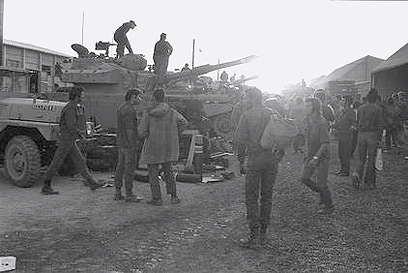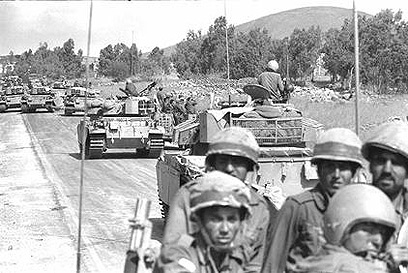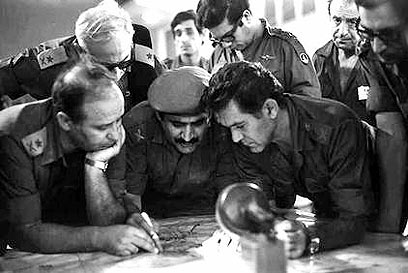
Wikileaks reveals 1973 war files: 'Changes in attitude toward Arabs'
Website's library of US diplomacy features records of 1973 US ambassador to Israel, shedding light on Yom Kippur War, developments in region
"The collection covers US involvements in, and diplomatic or intelligence reporting on, every country on earth," the library website notes.
Related stories:
- Declassified documents reveal failures of Yom Kippur War
- Ex-IDF chief's testimony reveals truth hidden from public
- The shattered myth of Moshe Dayan
Among the numerous documents, one can find telegrams sent from the US embassy in Israel during the Yom Kippur War to the White House. Kenneth Keating, who served as the American ambassador to Israel from 1973 to 1975, presented the White House with war strategy analyses.
Here are some of Keating's observations from the Wikileaks library:
1973 October 8, 10:41 (Monday)
Original Classification: SecretCurrent Classification: Unclassified
1. As we move into the third day of this war, I believe it is still fairly certain to say that Israel is going to win it.
2. Today is probably the critical day… If the cloudy weather which prevails this morning should inhibit the use of the Israeli air force to full effect against the Syrian armor, the Israeli ground forces could have their hands full, since mobilization still ongoing and reinforcements are not all in place. As a result, the war could last longer and could cost more than we had thought yesterday.
3. One thing is becoming clear: Israeli casualities (sic) on both fronts are mounting. The seriousness of this factor is implied in the fact that the GOI (government of Israel) is not telling its people secret about it (nor is it giving us hard info on the subject). I believe that when the full impact is felt in Israel on the blood this war will have cost, the GOI's political options may be reduced: the nation will expect a decisive war outcome and a postwar situation which looks secure for Israel.

Yom Kippur War (Photo: GPO)
4. Another thing which the GOI is shielding its public from is the seriousness of the difficulties the IDF is facing. Obviously the GOI's first consideration in doing so is the maintenance of morale. A secondary consideration might be Jordan: surely the Israelis appreciate that Jordan (with memories of 1967) does not believe Syrian and Egyptian military communiqués and is more inclined to accept the Israeli version as accurate. Keeping Jordan out of the war must be high Israeli priority.
5. As soon as we have a better idea of how long the war is going to last and what it is going to cost Israel, we will be better able to judge the direction in which the USG can usefully seek to guide Israeli policy.
1973 October 9, 06:11 (Tuesday)
Original Classification: Secret
Current Classification: Unclassified
1. As Israel's fortunes in war are taking turn for better, moment is approaching when we must decide if and how us is to seek to influence Israeli actions as they may affect postwar situation in area.
2. We have heard from Israeli contacts that GOI is increasingly being criticized privately for not having taken preemptive military action before Arabs attacked October 6 or/and for not having mobilized sooner. We cannot judge how widespread this criticism is. However, if as we fear Israeli casualties have been numerous in this war, criticism will spread when casualties become known. And with election approaching, GOI will be sensitive.
3. There are already calls in press for Israel to administer thorough trouncing to Syria and Egypt to compensate for Israel's having allowed itself to become victim of Arab attacks. Conceivably, pressures upon and within GOI may mount to pursue one of following two scenarios:
(A) Israel drives all Egyptian and Syrian forces back behind pre-October 6 ceasefire lines, then in hot pursuit destroys them inside Egypt and Syria proper, and occupies some additional territory; (B) Israel drives all Egyptian and Syrian forces back behind pre-October 6 ceasefire lines, engages in hot pursuit in some instances and then pulls these Israeli forces back within pre-October 6 lines, but then continues aerial attacks on military targets in Egypt and Syria proper for two or three additional days.
4. From US viewpoint, massive Israeli destruction of Egyptian and Syrian war machines at end of this war offers no advantages that we can discern. It can be argued that part of difficulty in achieving political settlement following 1967 war may have resulted from Arab feeling Israelis had been lucky and Arabs had not been thoroughly defeated. Whatever the case, Israeli overkill in this instance unlikely to have effect of inducing Arabs to come quickly to negotiating table.
5. Disadvantages from US viewpoint of massive Israeli destruction of Egyptian and Syrian war machines – and certainly of any Israeli occupation of additional territory – seem obvious: harm would be done to whatever chances there may be for Arab-Israeli settlement, and Israel would lose whatever advantage will otherwise accrue from growing international recognition of fact that Israel was victim of aggression in this latest war.

'Israel intends to occupy no additional territory' (Photo: GPO)
6. Optimum scenario, as I see it from point of view of US interests, would be for Israel to declare forthwith, before end of war, that (A) Israel wishes in this war only to drive back Egyptian and Syrian forces to pre-October 6 lines, not to crush Egypt and Syria; (B) Israel will stop shooting once this is accomplished if other side also stops; (C) Israel intends to occupy no additional territory; and (D) Israel will continue after war to seek peace settlement with Egypt, Syria, and Jordan under which, among other things, Israel would withdraw its forces from territories occupied in June 1967 war to secure and recognized boundaries.
7. For reasons stated above, chances of getting GOI to make such declaration are probably not good, but I think we should try. Israeli dependence on US to ward off pressures for ceasefire before expulsion of remaining Egyptian forces east of canal, and Israeli need after this war for additional military hardware from US, are factors in our favor. If we decide to go this route, I believe we should start consultations with Israelis quickly, since military situation moving rapidly and
We will need to have input into GOI decision-making process before positions in cabinet are crystallized.
1973 October 12, 14:09 (Friday)
Original Classification: SecretCurrent Classification: Unclassified
1. While we have not had opportunity in past few days to learn private views of Israeli leadership on such matters, those Israelis with whom we have spoken, including Israeli military officers, seem to be experiencing some changes in attitude toward Arabs which is parallel to growing Egyptian self-confidence vis-à-vis Israel described in REFTEL. For example, these Israelis are saying they must rethink their previous assumption about Arab character, courage, ability to learn modern technology, and capacity for planning, coordination, and keeping of secrets. They are impressed by Egyptian-Syrian strategy and war effort so far.2. This does not necessarily bode well for future Middle East peace efforts. Out of its newly gained respect for Arab military prosess (sic), Israel may be still more concerned about seeking enlarged borders than before. But changed Israeli attitude could, at least in one small respect, help: Israeli references to Arabs secret in future way omit note of condescension occasionally present in past.

(Photo: David Rubinger, GPO)
3. These Israelis have also been watching carefully Egyptian and Syrian descriptions of war aims. They have been interested in occasional hints (c.f. FBIs Kyrenia 081013z October: text of Syrian radio appeal to Israeli troops) out of Cairo and Damascus that objective is not destruction of Israel but only liberation territories Israel occupied in 1967. (Our contacts have also noted that GOE war reports have been calmer and although considerably exaggerated at least, more factual than in 1967.) These Israelis tend to doubt Arabs have had change of heart on question of Israel's right to exist, but they are struck by political sophistication lying behind such moderate Arab approach, and they allow themselves tiny bit of hope that Arabs have become more realistic about possible peace settlement with Israel.
4. As in case of Egyptian mood described in REFTEL, Israeli ability at this moment to look at Arabs with new respect may be fleeting, since wars can so charge atmosphere with emotions, especially if civilian toll mounts.
5. US int (sic) Cairo has suggested (REFTEL) that newly self-confident Egypt might even be able to face Israel directly in negotiations, have proven itself in its own eyes by seizing Barlev line. If Egypt while still in possession of Barlev line should communicate officially to Israel a readiness to enter into direct negotiations without preconditions, this of course would have impact on GOI, but it is very hard to guess how much. It is true that before this war started there were those in Israel, evidently including (Moshe) Dayan, who were speculating about possibility of renewed Israeli effort to reach interim agreement with Egypt under which Egypt would place military force east of canal and Israel would withdraw its forces to eastern Sinai. I am afraid, however, facts that (A) Israel was victim of surprise Egyptian attack October 6 and (B) Israel has sustained heavy human losses as result of this may have changed the ballgame.
6. It is too early to tell, but our impression is that effect of secret war on Israeli public opinion re overall territorial issue has been, so far, to reinforce both moderates and hardliners in their preexisting views. There are indeed voices saying war has proved that 1967 ceasefire lines were not really secure and that Israel's attitude on territorial question in recent years was wrong. For example, (Daniel) Bloch, a journalist generally recognized as dovish, wrote in Davar (newspaper) October 10 that one of many myths exploded by war was idea that 1967 ceasefire lines were much easier to defend than 1948 armistic (sic) lines... But most voices we have heard are saying the opposite, and since hardliners on this subject far outnumbered moderates on eve of war, we suspect that if anything their number is much greater today.
7. Against this background, tendency in Israel will probably be to insist on driving Egyptians back across canal as matter of principle. Much would depend on circumstances and nature of any Egyptian message: public unambiguous Egyptian declaration would of course have greater impact than message th(r)ough third party.
8. One thing seems clear: if Egyptians were to convey readiness for talks to Israel, and if at that time Israel should be seriously tiring in its war effort, Egyptian message to Israel might conceivably change situation entirely and would be worth a try.
The Wikileaks Public Library of US Diplomacy
- Receive Ynetnews updates directly to your desktop










